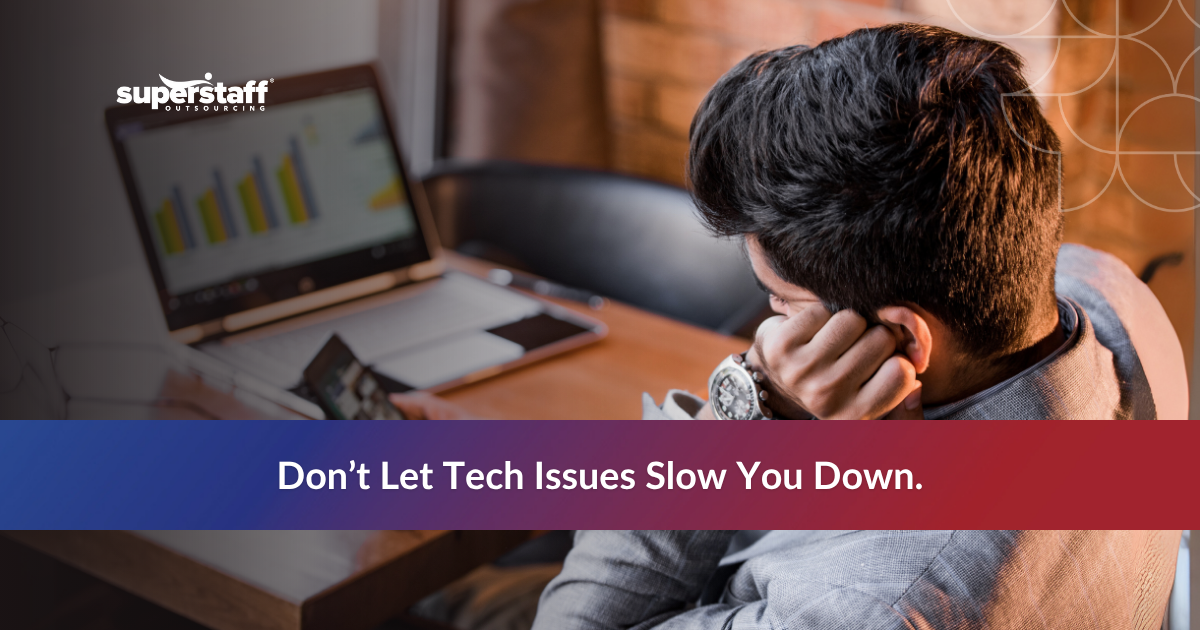
When the same tech issues keep piling up—password resets, printer glitches, VPN access problems—it’s usually your internal outsourced IT help desk team that takes the hit. What starts as a few routine requests can quickly snowball into an overwhelming backlog that delays bigger projects, frustrates employees, and impacts productivity. If your in-house support team spends more time putting out fires than driving innovation, it might be time to reconsider your current approach.
But here’s the tricky part: knowing when to make the shift to an outsourced IT help desk isn’t always straightforward. The signs can creep in slowly—longer ticket resolution times, mounting end-user complaints, or missed IT SLAs—until the strain becomes impossible to ignore. Acting too late can lead to more than just internal bottlenecks; it can cost you customers, revenue, and valuable talent.
In this blog, we’ll break down the top reasons to outsource your help desk in 2025—seven unmistakable signs that it’s time to make the shift to outsourced IT support and how it can help you future-proof your operations.
1. Your Internal IT Team Is Overwhelmed With Basic Requests
If your tech team is spending more time resetting passwords than innovating, it’s a sign to reassess.
Level 1 and Level 2 tickets—simple fixes like account unlocks, printer errors, and software installations—may seem harmless individually. But collectively, they consume a significant portion of your IT staff’s time. Instead of tackling strategic priorities like network upgrades or cybersecurity protocols, your engineers are tied up solving repetitive user issues.
That’s a steep opportunity cost. You’re paying skilled, highly trained professionals to handle problems that an outsourced IT support team could resolve just as efficiently—if not more so—at a fraction of the cost. Over time, this mismatch can erode morale, as talented staff feel underutilized and burnt out from repetitive tasks.
When routine requests start bogging down your team, the bigger picture suffers. Innovation slows. Strategic initiatives get delayed. And your internal IT staff loses the ability to focus on what truly drives the business forward.
2. You’re Scaling Fast and Can’t Hire IT Staff Quickly Enough
Growth is great—unless your IT help desk can’t keep up.
Scaling a company brings excitement, but also complexity. Every new hire means a new device, account setup, training support, and ongoing technical assistance. Now multiply that by dozens—or hundreds—of employees. Suddenly, your lean IT department is scrambling to onboard users and respond to mounting support tickets.
This gap is particularly challenging for startups or midmarket companies in growth mode. You want to move fast, but hiring IT staff takes time—especially with the ongoing talent shortage in the tech sector. Recruitment, onboarding, and training can drag out for weeks, leaving your existing staff overwhelmed.
This is where outsourced IT support services shine. Outsourcing providers can quickly ramp up support capacity, providing trained professionals who are ready to handle your ticket volume immediately. No delays. No backlogs. Just seamless scalability.
And when tech hiccups delay productivity, your bottom line takes a hit. So why wait?
3. Ticket Resolution Times Are Slipping (and Users Are Complaining)
Slow support can quietly kill productivity across the organization.
IT isn’t just a back-end function anymore—it’s a business-critical engine. When tickets take too long to resolve, the ripple effect spreads fast. Employees can’t access essential tools. Managers miss deadlines. Customers experience delays. And leadership starts asking why IT can’t keep up.
Common red flags include:
- First-response times creeping up
- Mean time to resolution (MTTR) lengthening
- Tickets piling up in the queue
Worse, these issues can fly under the radar until complaints surface or internal metrics make the problem undeniable.
This is where service-level agreements (SLAs) become crucial. A reliable outsourced IT help desk partner provides structured performance standards, ensuring accountability and responsiveness. They’re staffed and trained to handle large ticket volumes with precision—reducing downtime and boosting end-user satisfaction.
If your metrics aren’t improving—or worse, declining—it’s time to rethink the structure.

4. You Need 24/7 Tech Support but Can’t Justify the Cost In-House
Round-the-clock coverage is essential, but building it internally is expensive.
Today’s businesses operate globally and around the clock. Whether you’re supporting remote teams, international clients, or mission-critical systems, downtime is never acceptable. But offering 24/7 in-house support means staffing night shifts, weekends, and holidays—at a premium rate.
That’s not just costly—it’s unsustainable. You’ll face higher salaries, increased burnout, retention challenges, and limited flexibility.
In contrast, an outsourced IT help desk can deliver true 24/7 tech support at a cost that makes financial sense. With agents located in multiple time zones and working in shifts, they provide uninterrupted service without the burden of internal scheduling nightmares.
If after-hours issues hurt your global or remote operations, outsourcing is the fix. It’s how leading companies maintain responsiveness without breaking the budget.
5. Your Business Is Embracing Remote or Hybrid Work
Supporting a distributed workforce requires scalable, agile IT help desk solutions.
The workplace has changed for good. With more businesses operating remotely or in hybrid models, IT departments face new challenges:
- Supporting users across different geographies and time zones
- Managing devices outside of secure networks
- Troubleshooting over Zoom or remote desktop tools
- Coordinating VPN access, endpoint protection, and software updates
Internal teams not built for remote support can quickly fall behind. But outsourced IT support teams are built for this reality. They’re trained on a wide variety of tools, familiar with diverse system environments, and adept at resolving issues remotely—without being on-site.
They offer the flexibility your business needs to support employees wherever they are, whenever they need help.
As work becomes borderless, your IT support model needs to adapt. Outsourcing makes that possible without overloading your internal team.
6. Your Security and Compliance Requirements Are Increasing
Outdated or inconsistent help desk practices can pose serious risks.
Security isn’t just an IT concern—it’s a business imperative. From data privacy to regulatory compliance, the stakes are higher than ever. And your help desk plays a more critical role than many realize.
If endpoints aren’t secured, access logs aren’t maintained, or documentation is inconsistent, you open the door to compliance violations and security breaches. That’s a big risk to take.
Outsourced IT support services offer a structured, auditable process backed by certifications like SOC 2, HIPAA, ISO 27001, and more. These teams follow standardized protocols for data handling, user verification, and escalation—ensuring every ticket is processed with security and compliance in mind.
They also offer proactive incident management, ensuring that potential issues are caught early and resolved before they escalate.
An outsourced team doesn’t just handle tech—they help protect your reputation.
7. You Want Predictable, Scalable IT Support Costs
Unpredictable support demands make budgeting tough—outsourcing offers stability.
One of the hardest things about managing an internal IT help desk is budgeting. Costs fluctuate based on demand, headcount, turnover, and the ever-growing list of tools and licenses. When a surge in support requests hits, you either stretch your team thin or scramble to hire more staff—both of which can derail financial planning.
With an outsourced IT help desk, you get flexible pricing models tailored to your needs. Whether it’s per-ticket, per-seat, or a dedicated FTE structure, outsourcing gives you cost transparency and control. You can scale up or down depending on seasonal demand or company growth.
Flat rates or usage-based pricing models eliminate surprises and make financial planning easier.
Top reasons to outsource your help desk in 2025 include not just better service—but smarter spending. Cost predictability is a competitive advantage—and outsourcing makes it possible.
Connect With the BPO Team at SuperStaff for Outsourced IT Help Desk Services
Recognizing the signs that it’s time to outsource your IT help desk can prevent disruptions, reduce costs, and improve support quality.
From overwhelmed internal teams and delayed ticket resolutions to the demands of remote work and rising compliance requirements, today’s tech challenges require more than just good intentions—they require smart solutions. Outsourcing isn’t just a cost-saving move anymore; it’s a strategic play to unlock agility, expertise, and business continuity.
If your company is experiencing any of the 7 signs we’ve discussed, don’t wait until issues boil over.
Looking to ease the load and boost performance? SuperStaff offers 24/7 outsourced IT help desk solutions tailored to your business. Whether you need scalable coverage, round-the-clock support, or compliance-ready ticket handling, our expert teams are ready to help.
Talk to us today and scale your support, the smart way.






